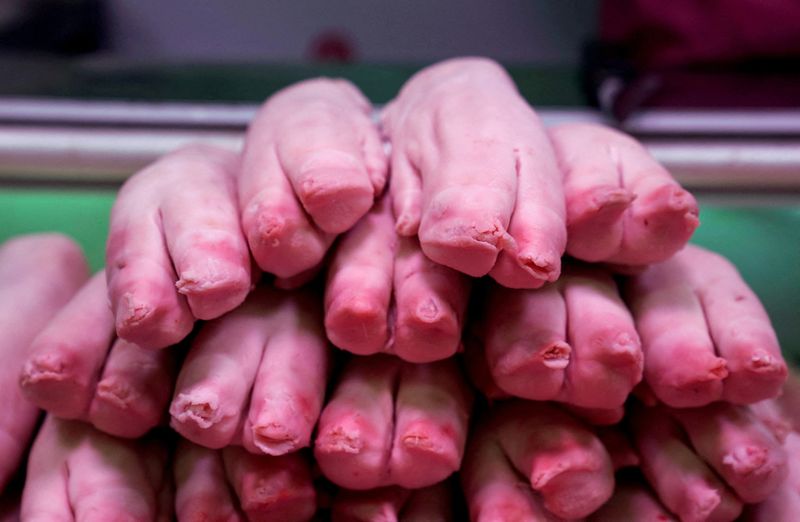China’s dumping probe another test of resilience for Spain’s pig farmers
2024.06.20 02:11
By Corina Pons, Emma Pinedo and Charlie Devereux
MADRID (Reuters) – China’s dumping probe into EU pork imports following duties slapped on Chinese EVs, caught Spain’s pig farmers on the hop this week, but the sector has proved it is resilient and far less vulnerable than the bloc’s car industry.
Spain supplied 22% of China’s imported pork in 2023, worth 1.2 billion euros ($1.29 billion), and stands to lose more than any of the bloc’s members from the probe into underpriced pork after the EU took aim at China’s subsidised electric vehicle imports last week.
“It was like a shock of cold water, we didn’t expect it,” said Giuseppe Aloisio, general director of the National Association of Spanish Meat Industries (ANICE), of the announcement.
“This is a concern because the volume is significant, but it will not bankrupt the pork sector if the Chinese end up deciding to impose tariffs,” he added.
The investigation was prompted by a complaint submitted by the China Animal Husbandry Association on behalf of the domestic pork industry, China said, without giving further details.
The subsidies received by the pork industry comply with World Trade Organization rules, Spain’s Agriculture Minister Luis Planas said in a press conference on Tuesday, adding that Spain is speaking to the EU about possible solutions.
With the probe likely to take at least a year to complete, there is plenty of time for negotiation.
Spain’s pork sector has shown itself to be resilient though, and the greater strategic importance of its car industry – the second-largest in Europe behind Germany – means Spain is unlikely to try and push the EU to row back its measures against Chinese EVs despite the threat of pork tariffs, said Miguel Otero, a senior analyst at Elcano Royal Institute in Madrid.
European automakers are being challenged by an influx of lower-cost EVs from Chinese rivals. The European Commission estimates their share of the EU market has risen to 8% from below 1% in 2019 and prices are typically 20% below those of EU-made models.
SACRIFICE THE PORK
“If the trade-off is you’re not going to export any pork to China but you keep the car industry as it is or you expand it, you sacrifice the pork,” Otero said.
Spain hasn’t stated a position on EV tariffs. The Economy Ministry declined to comment.
Cars and car parts accounted for 18% of Spain’s total exports and 10% of its gross domestic product in 2023, according to the Spanish Institute for Foreign Trade (ICEX). The industry was worth about 40 billion euros, according to the Spanish Carmakers Association.
The EU on June 12 placed extra duties on Chinese EVs to combat what it said were excessive subsidies and to protect an industry worth more than 1 trillion euros, according to McKinsey & Company.
Spain’s pork industry, meanwhile, withstood import bans by Russia over swine flu fears in 2009 and 2013 and after EU sanctions were imposed in 2014 on Russia for its annexation of Crimea.
Russia was Spain’s biggest customer outside the EU in 2012, importing 153 million euros of frozen pork before falling to just 180,000 euros in 2014.
The sector is ready to pivot to other markets again, as it did from Russia, said Alberto Herranz, director of Spain’s pork producers’ association Interporc.
“When the Russian market was closed, we didn’t go crying to the European Union, nor did we go crying to the Ministry of Agriculture, but what we did was to take a step forward and look for diversification,” Herranz said.
Trade with China picked up just as exports to Russia ground to a halt. Spain’s exports of frozen pork to China reached a peak of 2.5 billion euros in 2020 as an outbreak of swine flu ravaged China’s domestic production.
While China remains its largest market, exports have since fallen and are expected to keep falling as China’s production returns to normal. Meanwhile, exporters are already making contingency plans, growing other Asian markets such as Japan, South Korea and the Philippines, according to ICEX data.
Still, the bloc’s biggest pork producer, which has benefited from swine fever hitting Germany’s production, feels aggrieved it has become collateral damage in a fight between two of the world’s largest trading powers, said ANICE’s Aloisio.
“We see ourselves as spectators and victims of a train crash between great economic powers, and we are beginning to pay the price,” he said.
But the response from China could have been far worse given that the pork industry is a small percentage of EU exports to China and that producers have time to adapt and suggests an unwillingness to square up for a fight, Eurointelligence analysts wrote in a note.

“It may show that China is willing to cut a deal with the EU over the tariffs, rather than treat them as the opening salvo of a trade war,” Eurointelligence said.
($1 = 0.9312 euros)








